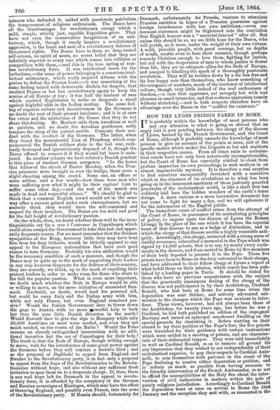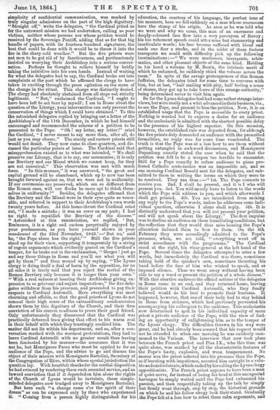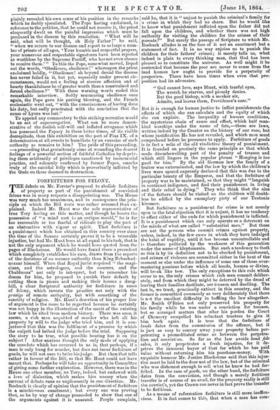HOW THE LYONS PRIESTS FARED IN ROME.
IT is probably within the knowledge of most persons who pay any attention to what is going on abroad that an angry suit is now pending between the clergy of the diocese- of Lyons, backed by the French Government, and the Court of Rome, although it probably exceeds the knowledge of most persons to give an account of the points at issue, and of the specific matter which makes the litigants so hot and stubborn in their respective causes. From all times suits in ecclesias- tical courts have not only been notoriously incomprehensible, but the Court of Rome has especially studied to cloak from profane inspection its own proceedings in such matters in an almost impenetrable mystery. It is therefore a real surprise to find ourselves unexpectedly furnished with a narrative- which in the clearness of its revelations as to what has been going on in the innermost sanctuary of those jealously guarded. penetralia of the ecclesiastical world, is like a shaft that haa suddenly laid bare the hidden wonders of the earth's inner doings. A more curious or a more instructive document has not come to light for many a day, and we will epitomize it for the information of the English public.
The immediate cause of conflict arises from the attempt of the Court of Rome, in pursuance of its centralizing principles of policy, to impose upon the diocese of Lyons the Roman. Liturgy in the place of the one which it has been the especial boast of that diocese to use as a badge of distinction, and to which the clergy of that diocese ascribe a highly venerable anti- quity. Accordingly, this clergy, animated with a strong sense of dutiful reverence, subscribed a memorial to the Pope which was- signed by 14,000 priests, that is to say, by nearly every eccle- siastic in the diocese, and then carried to Rome by five members of their body deputed to present it to the Pope. These five priests have been to Rome on the duty entrusted to their charge, and have addressed to their fellow clergy at Lyons a report of what befell them on their mission, which report has been pub- lished by a leading paper in Turin. It should be stated for those who have no previous acquaintance with the subject that the practically unanimous feeling of the clergy of the diocese was not participated in by their Archbishop, Cardinal Bonald, who had been at Rome for some time when the was sent thither, and actively advocated sub- mission to the changes which the Pope was anxious to intro- duce. These views, however, had not always been those of the Archbishop, for twenty years ago, but before he was a Cardinal, he had both published an edition of the impugned Breviary and issued an episcopal tnandement dwelling on the special grounds for cherishing it. Before• starting on their errand to lay their petition at the Pope's feet, the five priests were furnished for their guidance with certain instructions- which were settled in a meeting of priests, and are character- istic of their deferential temper. They were told immediately to wait on Cardinal Bonald, so as to remove all ground for any impression that they wished to act independently of their ecclesiastical superior, to pay their respects to Cardinal Anto- nelli, to arm themselves with patience in the event of the Pope declining to receive either deputation or petition, and to refrain as much as possible from having recourse to the friendly intervention of the French Ambassador, so as not to offend the susceptibilities of the Holy See about the inter- vention of civil authorities in matters within the pale of purely religious jurisdiction. Accordingly to Cardinal Bonald the deputation went at once on arrival in Rome the 23rd January and the reception they met with, as recounted in the- simplicity of confidential communication, was marked by truly singular admissions on the part of the high dignitary. "Straight off," write the delegates, "the Cardinal pitied us for the untoward mission we had undertaken, calling rut poor victims, neither whose persons nor whose petition would be received by the Sovereign Pontiff, adding that as for that big bundle of papers, with its fourteen hundred signatures, the best that could be done with it would be to throw it into the fire in the sharp cold weather." But the five priests were not men to be got rid of by facetiousness, and pertinaciously insisted on worrying their Archbishop into a serious conver- sation. Perhaps he thought to relieve himself by boldly taking the initiative into his own hands. Instead of waiting for what the delegates had to say, the Cardinal broke out into complaints at the part which he affirmed the clergy to have taken in exciting through the press agitation on the score of the change in the ritual. This charge was distinctly denied. The clergy had absolutely abstained from all steps not strictly legitimate. "But," exclaimed the Cardinal, "I ought to have been left to act here by myself; I am in Rome about the question of the Liturgy, your intervention can only prevent the conservation of things which I could have obtained." To this the astonished delegates replied by bringing out a letter of the Archbishop's of the 11th December, in which he had himself encouraged and recommended the scheme of a petition to be presented to the Pope. " Oh ! my letter, my letter !" cried the Cardinal, "I never meant to say more than, after all, do just as you may choose." The sturdy and earnest priests still would not desist. They now came to close quarters, and dis- cussed the particular points at issue. The Cardinal said that misapprehension existed as to what was intended, "We shall preserve our Liturgy, that is to say, our ceremonies; it is only our Breviary and our Missal which we cannot keep, for they are not canonical." This observation was met with much force. "In this manner," it was answered, "the great and capital ground will be abandoned, which up to now has been brought forward against us, that we were not in uniformity. If our ceremonies are preserved, which are so different from the Roman ones, will our flocks be more apt to think them- selves in uniformity ?" Besides, the delegates affirmed that the Breviary and the Missal were in their eyes quite as vener- able, and referred in support to their Archbishop's own words twenty years before. At this home-thrust the Cardinal cried out, "I made a mistake ; it was an error on my part; I had no right to republish the Breviary of the diocese." " Astonished at this renunciation, we replied, But, Eminence, it is a right and custom perpetually enjoyed by your predecessors, as you have yourself shown in your mandentent of the 23rd November, 1843.'—' But no,' said he, the Pope alone has the right.'" Still the five priests stood up for their view, supporting it temperately by a string of cogent arguments which evidently grated on the Cardinal's temper, for he broke out in the exclamation, "Gorges ! just go and say these things in Rome and you'll see what you will get by them!" and then wound up by saying, "The Lyons clergy is doing itself a deal of harm by the opposition, for on all sides it is freely said that you reject the recital of the Roman Breviary only because it is longer than your own." "With a real sadness at hearing their Archbishop giving ex. pression to so grievous and unjust imputations," the five dele- gates withdrew from his presence, and proceeded to pay their respects to Cardinal Antonelli. Here everything was most charming and affable, so that the good priests of Lyons do not conceal their high sense of the extraordinary condescension shown them by this dignitary of the Church, and their firm conviction of his sincere readiness to prove their good friend. Only unfortunately they discovered that the Cardinal was practically debarred from giving that effect to his warm zeal in their behalf with which they trustingly credited him. The matter did not lie within his department, and so, after a con- versation marked with the warmest protestations, they had to leave Cardinal Antonelli with no greater result than having been fascinated by his manner—the assurance that it was not he, but Monsignore Pacer' who must be applied to for an audience of the Pope, and the advice to go and discuss the object of their mission with Monsignore Bartolini, Secretary of the Congregation of Rites, within whose special jurisdiction the question lay. With heartfelt thanks for the cordial disposition he had evinced by rendering them such essential service, and an inward conviction that if it depended on him alone the rights of the Church of Lyons would be inviolate, these simple- minded delegates now trudged away to Monsignore Bartolini.
But here such "a change came o'er the spirit of their dream" as can be expressed only by those who experienced it. "Coming from a person highly distinguished for his education, the courtesy of his language, the perfect tone of his manners, here we fell suddenly on a man whose coarseness bore the stamp of his origin. As soon as he was told who we were and why we came, this man of an enormous and deeply-coloured face flew into a very paroxysm of frenzy ; his too vehement speech could utter none but stammering and inarticulate words; his face became suffused with blood and made one fear a stroke, and in the midst of these furious transports we could with difficulty pick up the following incriminations :—" We were mutineers, insurgents, schis- matics, and other pleasant objects of the same kind. Holding in his hand a volume by M. Bouix, the intrinsic merit of which he enhanced, he suddenly shied the volume across the room." In spite of the savage grotesqueness of this Roman jefferies, the delegates tried for some time to converse with him, but at last, "half smiling with pity, half feeling a sense of shame, they got up to take leave of this strange authority," being determined never to visit him again. So far the Lyons delegates had had some rather strange inter- views, but were really not a whit advanced in their business, viz., to see the Pope, and present to him the petition. Now, it is an established usage that the Pope is accessible to every priest. Nothing is wanted but to express a desire for an audience and the ecclesiastic is admitted with the shortest possible delay to the presence of his highest superior. On this occasion, however, the established rule was departed from, for although the five priests duly demanded an audience with the prescribed formalities, no reply was for some time vouchsafed. The truth is that the Pope was at a loss how to see them without getting entangled in awkward discussions, and Monsignore Dupanloup exactly stated the case when he said that the petition was felt to be a weapon too terrible to encounter. Still for a Pope roundly to refuse audience to pious pro- fessed Catholic ecclesiastics was an impossible act, and so one morning Cardinal Bonald sent for the delegates, and sub- mitted to them in writing the terms on which they were to be received. They ran thus :—" 1st. The Pope consents to receive you. 2nd. I shall be present, and it is I who will present you. 3rd. You will merely have to listen to the words which the Pope will address to you, and which afterwards I shall get printed. 4th. You are interdicted from making any reply to the Pope's words, unless he addresses some indi- vidual question, otherwise I alone shall reply. 5th. It is distinctly understood that you will not present your petition, and will not speak about the Liturgy." The first impulse was to decline an audience on these humiliating conditions, but the reflection that they would thus miss hearing the Pope's allocution induced them to bow to them. On the 4th February they were accordingly admitted to the Pope's presence, when, we are told, " everything went off in strict accordance with the programme." The Cardinal stood at the right, his vicar-general at the left hand of the Pope. Several times the delegates attempted to utter a few words, but immediately the Cardinal was there, sometimes taking hold of the speaker's arm, sometimes thrusting his hand before the face of him who wished to speak, and so imposed silence. Thus we went away without having been able to say a word or present the petition of a whole diocese."
With this abortive audience the official actions of the delegates in Rome came to an end, and they returned home, leaving their petition with Cardinal Antonelli, who they fondly believed would do his best to promote their business. It happened, however, that one of their body had to stay behind in Rome from sickness, which had previously prevented his accompanying his colleagues to the audience. This ecclesiastic now determined to qgek in his individual capacity of mere priest a private audience of the Pope, with the view of find- ing an opportunity of enlightening him as to the temper of the Lyons clergy. The difficulties thrown in his way were great, and he had already been assured that his request would not be attended to when one morning he was suddenly sum- moned to the Vatican. The interview that now took place between the French priest and Pius IX., who this time was quite alone, was marked by all the characteristic features of the Pope's hasty, explosive, and weak temperament. No sooner was the priest ushered into his presence than the Pope, as if bursting with impatience, accosted him outright in a vole- ble andexcited strain,which ended by his calling the Lyons clergy oppositionists. The French priest appears to have been a man of quiet nerve, for instead of losing his head at this unexpected harangue he simply waited until the Pope had exhausted his passion, and then respectfully taking up the talk he simply but firmly went through, step by step, the histoncal grounds on which he and his fellow clergy took their stand. Gradually the Pope felt at a loss how to rebut these calm arguments, and plainly revealed his own sense of his position in the remarks which he feebly ejaculated. The Pope having exclaimed, in reference to the petition, that he could not receive it, the priest eloquently dwelt on the painful impression which must be produced in the diocese by this resolution. "What will be said, what will be thought, oh Holy Father!" he said, "when we return to our diocese and report to so large a num- ber of priests of all ages, 'Your humble and respectful prayers, your numerous and respectable signatures have been rejected as worthless by the Supreme Pontiff, who has not even chosen to receive them.'" To this the Pope, somewhat moved, lisped out the words, "Obedience, obedience!" whereupon the priest exclaimed boldly, " Obedience ! oh beyond denial the diocese has never failed in it, but yet, especially under present cir- cumstances, would not a feeling of sincere affection and of hearty thankfulness be of greater worth than a constrained and forced obedience ?" With these warning words ended this remarkable interview. Softly murmuring obedience once again, the Pope gave his parting blessing, and the French ecclesiastic went out, "with the consciousness of having done his duty, but sadly penetrated with the conviction that the cause of Lyons was lost."
To append any commentary to this striking narrative would be an act of supererogation. What can be more demon- strative of the foolish self-will and inflated arrogance which has possessed the Papacy in these latter times, of its visible decrepitude, than this exhibition on the part of Pius IX. of a determination at all events to humiliate by an exercise of such authority as remains to him? The pride of this proceeding, —a proceeding that gratuitously aims at wounding the dearest feelings of a powerful section of faithful Catholics by depriv- ing them arbitrarily of privileges sanctioned by immemorial practice, and solemnly confirmed by former Popes, smacks truly of the suicidal folly which is proverbially inflicted by the Gods on those doomed to destruction.
































 Previous page
Previous page